homophones英语常用同音异义异形词
- 格式:doc
- 大小:16.00 KB
- 文档页数:2
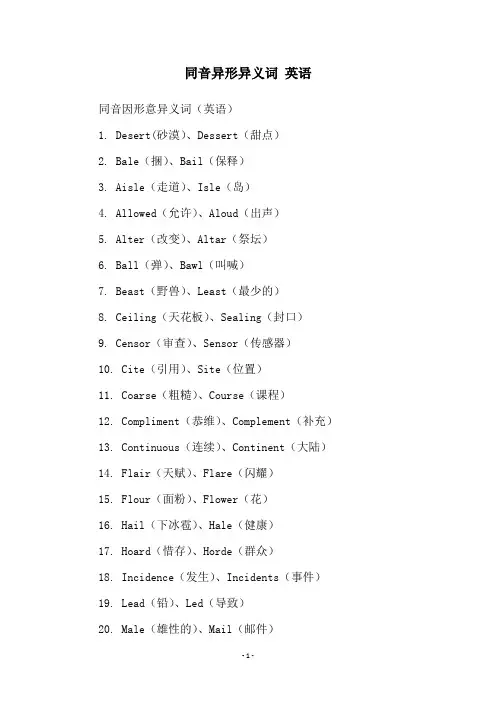
同音异形异义词英语同音因形意异义词(英语)1. Desert(砂漠)、Dessert(甜点)2. Bale(捆)、Bail(保释)3. Aisle(走道)、Isle(岛)4. Allowed(允许)、Aloud(出声)5. Alter(改变)、Altar(祭坛)6. Ball(弹)、Bawl(叫喊)7. Beast(野兽)、Least(最少的)8. Ceiling(天花板)、Sealing(封口)9. Censor(审查)、Sensor(传感器)10. Cite(引用)、Site(位置)11. Coarse(粗糙)、Course(课程)12. Compliment(恭维)、Complement(补充)13. Continuous(连续)、Continent(大陆)14. Flair(天赋)、Flare(闪耀)15. Flour(面粉)、Flower(花)16. Hail(下冰雹)、Hale(健康)17. Hoard(惜存)、Horde(群众)18. Incidence(发生)、Incidents(事件)19. Lead(铅)、Led(导致)20. Male(雄性的)、Mail(邮件)21. Pair(一双)、Pear(梨)22. Peace(和平)、Piece(片)23. Plan(计划)、Plane(飞机)24. Pole(竿)、Poll(民意测验)25. Poor(贫穷)、Pore(毛孔)26. Principals(校长)、Principle(原则)27. Quail(野鸡)、Quay(码头)28. Rain(雨)、Rein(缰绳)29. Right(正确)、Write(写)30. Rote(背诵)、wrote(写道)31. Row(排)、Roe(鱼卵)32. Sail(航行)、Sale(销售)33. Scene(景象)、Seen(瞥见)34. Sea(海)、See(看)35. Steak(牛排)、Stake(赌注)36. Steal(偷)、Steel(钢)37. Stationary(固定)、Stationery(文具)38. Stile(墙头隔板)、Style(风格)39. Tear(眼泪)、Tare(皮重)40. Their(他们的)、There(那里)41. Wait(等待)、Weight(重量)42. Weather(天气)、Whether(是否)43. Wear(穿着)、Where(何处)。
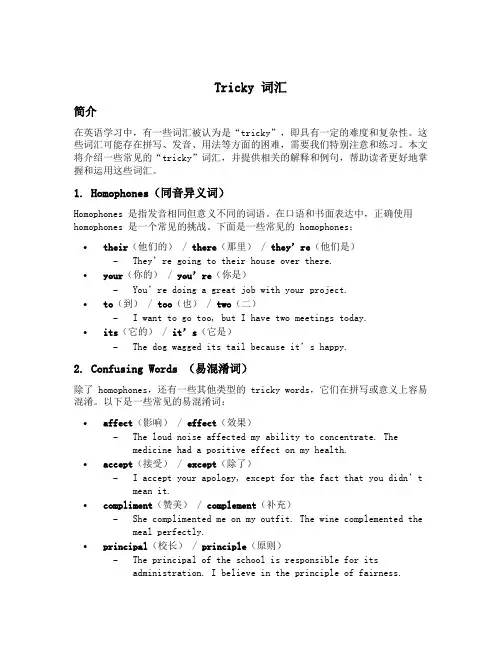
Tricky 词汇简介在英语学习中,有一些词汇被认为是“tricky”,即具有一定的难度和复杂性。
这些词汇可能存在拼写、发音、用法等方面的困难,需要我们特别注意和练习。
本文将介绍一些常见的“tricky”词汇,并提供相关的解释和例句,帮助读者更好地掌握和运用这些词汇。
1. Homophones(同音异义词)Homophones 是指发音相同但意义不同的词语。
在口语和书面表达中,正确使用homophones 是一个常见的挑战。
下面是一些常见的 homophones:•their(他们的) / there(那里) / they’re(他们是)–They’re going to their house over there.•your(你的) / you’re(你是)–You’re doing a great job with your project.•to(到) / too(也) / two(二)–I want to go too, but I have two meetings today.•its(它的) / it’s(它是)–The dog wagged its tail because it’s happy.2. Confusing Words (易混淆词)除了 homophones,还有一些其他类型的 tricky words,它们在拼写或意义上容易混淆。
以下是一些常见的易混淆词:•affect(影响) / effect(效果)–The loud noise affected my ability to concentrate. The medicine had a positive effect on my health.•accept(接受) / except(除了)–I acc ept your apology, except for the fact that you didn’t mean it.•compliment(赞美) / complement(补充)–She complimented me on my outfit. The wine complemented the meal perfectly.•principal(校长) / principle(原则)–The principal of the school is responsible for itsadministration. I believe in the principle of fairness.3. Phrasal Verbs (短语动词)Phrasal verbs 是由动词与介词或副词组合而成的短语,其意义往往与原始动词不同。
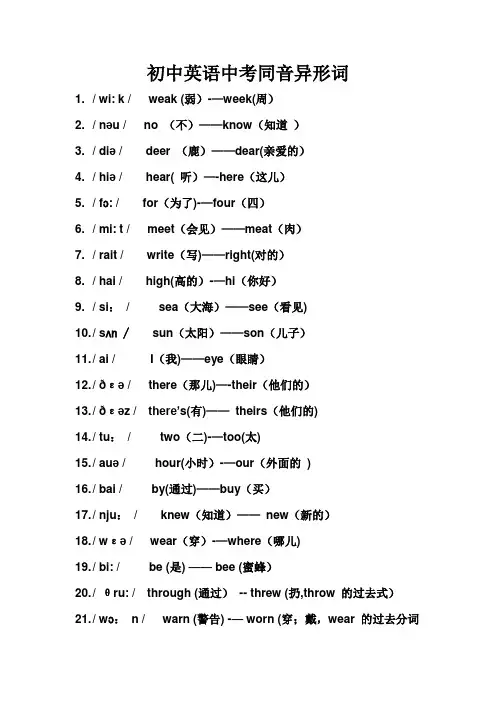
初中英语中考同音异形词1. / wi:k / weak (弱)-—week(周)2. / nəu / no (不)——know(知道)3. / diə / deer (鹿)——dear(亲爱的)4. / hiə / hear( 听)—-here(这儿)5. / fɔ: / for(为了)-—four(四)6. / mi:t / meet(会见)——meat(肉)7. / rait / write(写)——right(对的)8. / hai / high(高的)-—hi(你好)9. / si:/ sea(大海)——see(看见)10. / sʌn / sun(太阳)——son(儿子)11. / ai / I(我)——eye(眼睛)12. / ðεə / there(那儿)—-their(他们的)13. / ðεəz / there’s(有)——theirs(他们的)14. / tu:/ two(二)-—too(太)15. / auə / hour(小时)-—our(外面的)16. / bai / by(通过)——buy(买)17. / nju:/ knew(知道)——new(新的)18. / wεə / wear(穿)-—where(哪儿)19. / bi: / be (是) —— bee (蜜蜂)20. / θru: / through (通过)-- threw (扔,throw 的过去式)21. / wɔ:n / warn (警告) -— worn (穿;戴,wear 的过去分词22. / pa:st / past (经过)-passed (经过,pass的过去式或分词)23. / pεə / pear (梨) —- pair (一对;一双)24. / hu:z / whose (谁的)—— who' s (是谁,= who is)25. / həul / whole (整个的) —— hole (洞;孔;坑)26. / gri:n / green (绿色的)—— Green (格林)27. / rəud / road (路)-— rode (骑,ride 的过去式)28. / blu:/ blue (蓝色的)—- blew (吹,blow 的过去式)29. / fa:ðə / father (父亲) —- farther (较远,far 的比较级)30. / red / red (红色的) —— read (读,read 的过去式或分词)31. / si:n / scene (景象) —— seen (看见,see 的过去分词)32./ ʌnt / aunt (姑;姨;婶) -— aren' t (不是)33./ wʌn / one (一个)-—won(win 赢的过去式)34./ weit / wait(等)——weight(重量)35./æd / ad (广告)—-add(加上)36./ wei / way (道路)——weigh(称重)37./ weðə / weather(天气)—- whether(是否)38./ wu d / wood(木头)——would (将要)39./ r əu z / rose(玫瑰)—- rows(排行的复数)40./ eit / ate (eat 的过去式)——eight(八)41./ f l u :/ flew (flow的过去式)—-flu (逃跑)42./ n əu z / nose (鼻子)——knows(know的第三人称单数)43./k ɔ:k/ cock(公鸡)——cork(软木,软木塞)43./f l auə / flower(花)——flour(面粉)44./ mi:t / meet(会见)——mete(分配,给予,施以)45./ səu / sow(播种)-—sew(缝,做针线活,缝纫,装钉)46./ meid / made(制作make的过去式)——maid(女仆)47./ meil / mail(邮件)——male(男)48./ meid / made(制作make的过去式)——maid(女仆) 49./ diskr i:t/ discreet(谨慎的)-—discrete(分离的) 50./tu:/ to(向)-—two(二)。
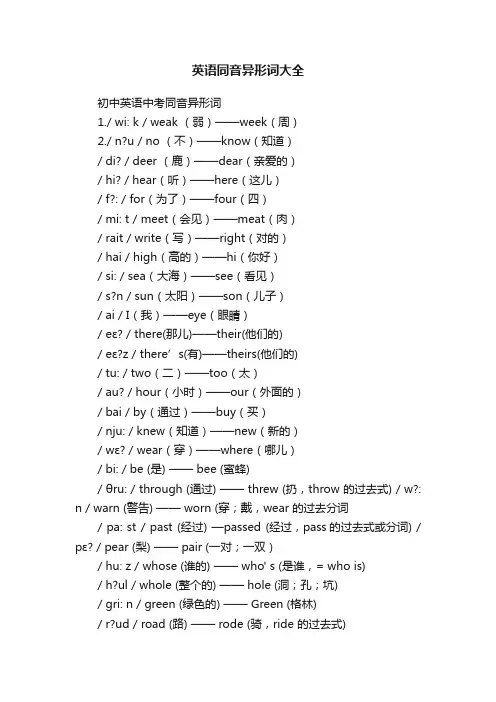
英语同音异形词大全初中英语中考同音异形词1./ wi: k / weak (弱)——week(周)2./ n?u / no (不)——know(知道)/ di? / deer (鹿)——dear(亲爱的)/ hi? / hear(听)——here(这儿)/ f?: / for(为了)——four(四)/ mi: t / meet(会见)——meat(肉)/ rait / write(写)——right(对的)/ hai / high(高的)——hi(你好)/ si: / sea(大海)——see(看见)/ s?n / sun(太阳)——son(儿子)/ ai / I(我)——eye(眼睛)/ eε? / there(那儿)——their(他们的)/ eε?z / there’s(有)——theirs(他们的)/ tu: / two(二)——too(太)/ au? / hour(小时)——our(外面的)/ bai / by(通过)——buy(买)/ nju: / knew(知道)——new(新的)/ wε? / wear(穿)——where(哪儿)/ bi: / be (是) —— bee (蜜蜂)/ θru: / through (通过) —— threw (扔,throw 的过去式) / w?: n / warn (警告) —— worn (穿;戴,wear 的过去分词/ pa: st / past (经过) —passed (经过,pass的过去式或分词) / pε? / pear (梨) —— pair (一对;一双)/ hu: z / whose (谁的) —— who' s (是谁,= who is)/ h?ul / whole (整个的) —— hole (洞;孔;坑)/ gri: n / green (绿色的) —— Green (格林)/ r?ud / road (路) —— rode (骑,ride 的过去式)/ blu: / blue (蓝色的) —— blew (吹,blow 的过去式)/ fa: e? / father (父亲) —— farther (较远,far 的比较级)/ red / red (红色的) —— read (读,read 的过去式或分词) / si: n / scene (景象) —— seen (看见,see 的过去分词)/ ?nt / aunt (姑;姨;婶) —— aren' t (不是)/ w?n / one (一个)——won(win 赢的过去式)/ weit / wait(等)——weight(重量)/ ? d / ad (广告)——add(加上)/ wei / way (道路)——weigh(称重)/ wee? / weather(天气)——whether(是否)/ wu d / wood(木头)——would (将要)/ r ?u z / rose(玫瑰)——rows(排行的复数)/ eit / ate (eat 的过去式)——eight(八)/ f l u :/ flew (flow的过去式)——flu (逃跑)/ n ?u z / nose (鼻子)——knows(know的第三人称单数) 43./k ?:k/ cock(公鸡)——cork(软木,软木塞)43./f l au? / flower(花)——flour(面粉)44./ mi: t / meet(会见)——mete(分配,给予,施以)45./ s?u / sow(播种)——sew(缝,做针线活,缝纫,装钉)46./ meid / made(制作make的过去式)——maid(女仆)47./ meil / mail(邮件)——male(男)48./ meid / made(制作make的过去式)——maid(女仆)49./ diskr i: t/ discreet(谨慎的)——discrete(分离的)50./tu:/ to(向)——two(二)。

英语同音异形词大全-CAL-FENGHAI.-(YICAI)-Company One1初中英语中考同音异形词1./ wi: k / weak (弱)——week(周)2./ nəu / no (不)——know(知道)3./ diə / deer (鹿)——dear(亲爱的)4./ hiə / hear(听)——here(这儿)5./ fɔ: / for(为了)——four(四)6./ mi: t / meet(会见)——meat(肉)7./ rait / write(写)——right(对的)8./ hai / high(高的)——hi(你好)9./ si: / sea(大海)——see(看见)10./ sʌn / sun(太阳)——son(儿子)11./ ai / I(我)——eye(眼睛)12./ ðεə / there(那儿)——their(他们的)13./ ðεəz / there’s(有)—— theirs(他们的)14./ tu: / two(二)——too(太)15./ auə / hour(小时)——our(外面的)16./ bai / by(通过)——buy(买)17./ nju: / knew(知道)—— new(新的)18./ wεə / wear(穿)——where(哪儿)19./ bi: / be (是) —— bee (蜜蜂)20./ θru: / through (通过) —— threw (扔,throw 的过去式)21./ wɔ: n / warn (警告) —— worn (穿;戴,wear 的过去分词22./ pa: st / past (经过) —passed (经过,pass的过去式或分词)23./ pεə / pear (梨) —— pair (一对;一双)24./ hu: z / whose (谁的) —— who' s (是谁,= who is)25./ həul / whole (整个的) —— hole (洞;孔;坑)26./ gri: n / green (绿色的) —— Green (格林)27./ rəud / road (路) —— rode (骑,ride 的过去式)28./ blu: / blue (蓝色的) —— blew (吹,blow 的过去式)29./ fa: ðə / father (父亲) —— farther (较远,far 的比较级)30./ red / red (红色的) —— read (读,read 的过去式或分词)31./ si: n / scene (景象) —— seen (看见,see 的过去分词)32./ ʌnt / aunt (姑;姨;婶) —— aren' t (不是)33./ wʌn / one (一个)——won(win 赢的过去式)34./ weit / wait(等)——weight(重量)35./ æ d / ad (广告)——add(加上)36./ wei / way (道路)——weigh(称重)37./ weðə / weather(天气)—— whether(是否)38./ wu d / wood(木头)——would (将要)39./ r əu z / rose(玫瑰)—— rows(排行的复数)40./ eit / ate (eat 的过去式)—— eight(八)41./ f l u :/ flew (flow的过去式)——flu (逃跑)42./ n əu z / nose (鼻子)——knows(know的第三人称单数) 43./k ɔ:k/ cock(公鸡)—— cork(软木,软木塞)43./f l auə / flower(花)—— flour(面粉)44./ mi: t / meet(会见)——mete(分配,给予,施以)45./ səu / sow(播种)——sew(缝,做针线活,缝纫,装钉)46./ meid / made(制作make的过去式)——maid(女仆)47./ meil / mail(邮件)——male(男)48./ meid / made(制作make的过去式)——maid(女仆)49./ diskr i: t/ discreet(谨慎的)——discrete(分离的)50./tu:/ to(向)——two(二)。
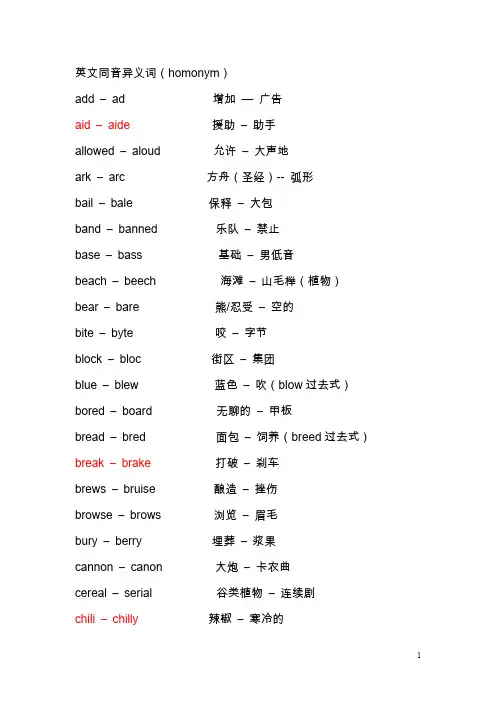
英文同音异义词(homonym)add –ad 增加—广告aid –aide 援助–助手allowed –aloud 允许–大声地ark –arc 方舟(圣经)-- 弧形bail –bale 保释–大包band –banned 乐队–禁止base –bass 基础–男低音beach –beech 海滩–山毛榉(植物)bear –bare 熊/忍受–空的bite –byte 咬–字节block –bloc 街区–集团blue –blew 蓝色–吹(blow过去式)bored –board 无聊的–甲板bread –bred 面包–饲养(breed过去式)break –brake 打破–刹车brews –bruise 酿造–挫伤browse –brows 浏览–眉毛bury –berry 埋葬–浆果cannon –canon 大炮–卡农曲cereal –serial 谷类植物–连续剧chili –chilly 辣椒–寒冷的choose –chews 选择–咀嚼clause –claws 条款–爪子colonel –kernel 上校–果仁complimentary –complementary 称赞的–补充的course –coarse 课程–粗糙的creak –creek 嘎吱声–小溪cruise –crews巡航–全体船员dessert –desert 甜点–沙漠die –dye 死亡–染色fate –fete 命运–庆祝find –fined 发现–罚款的flee –flea 逃跑–跳蚤flower –flour 花儿–面粉fur –fir 毛皮–冷杉guerrilla –gorilla 游击队–大猩猩heal –heel 治愈–脚后跟heroin –heroine 海洛因–女主角him –hymn 他–颂歌horse –hoarse 马–嘶哑的I’ll –isle –aisle 我将–小岛–过道idle –idol 懒散的–偶像knows –noses 知道(单三式)-- 鼻子(复数)know –no 知道–不leak –leek 泄露–韭菜led –lead 领导(lead过去式)–铅made –maid 制造(过去式)–女仆marshal –martial 总指挥–武术的mat –matt 垫子–无光泽的mayor –mare 市长–母马medal –meddle 奖章–干涉missed –mist 想念–薄雾not –knot 不–结one –won 一–赢(过去式)ours –hours 我们的–小时(复数)overseas –oversees 海外的–监督(单三式)pair –pear –pare 一双-- 梨-- 消减palate –palette –pallet 味觉-- 调色板-- 托盘paste –paced 浆糊-- 步伐的pour –pore 倾泻-- 毛孔peak –peek –pique 顶端-- 偷窥-- 怄气peer –pier 同龄人-- 码头pigeon –pidgin 鸽子-- 混杂语plum –plumb 李子-- 铅锤pole –poll 柱,杆-- 民意测验queue –cue 排队-- 提示rain –reign –rein 雨-- 统治-- 缰绳raise –raze –rays 升起-- 摧毁-- 射线sensor –censor 传感器-- 监察官sent –cent –scent 送(过去式)-- 分币-- 气味shoot –chute 射击-- 斜槽soar –sore 高飞-- 疼痛的soul –sole –Seoul 精神-- 唯一的-- 首尔(韩国首都)stair –stare 楼梯-- 盯着看stake –steak 柱子-- 牛排stationary –stationery 静止的-- 文具straight –strait 径直的-- 海峡swat –swot 猛击-- 苦读sweet –suite 甜的-- 套房tale –tail 故事-- 尾巴taught –taut 教(过去式)-- 拉紧的team –teem 组-- 充满tear –tier 眼泪-- 排,层tick –tic 勾号-- 抽筋time –thyme 时间-- 百里香toe –tow 脚趾-- 拖,拉vain –vein 徒劳的-- 静脉wait –weight 等待-- 重量warn –worn 警告-- 穿(wear过去式)waste –waist 浪费-- 腰wave –waive 海浪-- 放弃way –weigh 方法-- 称重week –weak 星期-- 虚弱的we’ll –wheel 我们将-- 车轮we’ve –weave 我们已经-- 编织whale –wail -- wale 鲸-- 痛哭-- 鞭痕what –watt 什么-- 瓦特where –wear –ware 哪里-- 穿-- 器皿whether –weather 是否-- 天气which –witch 哪一个-- 女巫whole –hole 整个的-- 洞wine -- whine 酒-- 哀号。
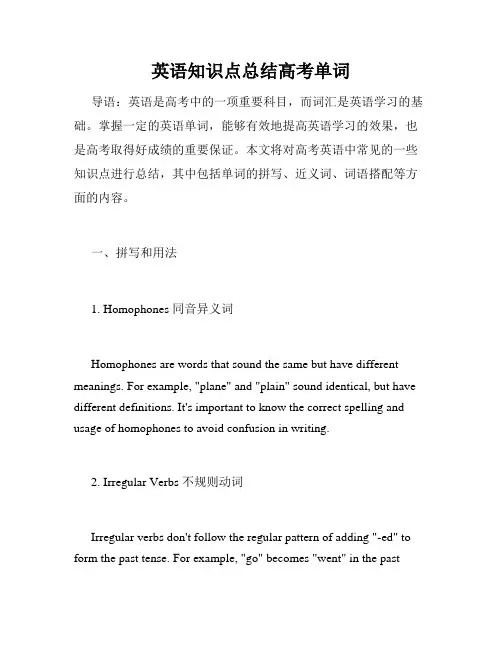
英语知识点总结高考单词导语:英语是高考中的一项重要科目,而词汇是英语学习的基础。
掌握一定的英语单词,能够有效地提高英语学习的效果,也是高考取得好成绩的重要保证。
本文将对高考英语中常见的一些知识点进行总结,其中包括单词的拼写、近义词、词语搭配等方面的内容。
一、拼写和用法1. Homophones 同音异义词Homophones are words that sound the same but have different meanings. For example, "plane" and "plain" sound identical, but have different definitions. It's important to know the correct spelling and usage of homophones to avoid confusion in writing.2. Irregular Verbs 不规则动词Irregular verbs don't follow the regular pattern of adding "-ed" to form the past tense. For example, "go" becomes "went" in the pasttense. Memorizing the irregular verbs and their past tense forms is essential for English learners.3. Prepositions 介词Prepositions are words that show the relationship between different elements in a sentence. They can be tricky to use correctly, especially for non-native English speakers. Understanding the correct preposition to use in different contexts is crucial for clear and accurate communication.二、近义词与词语搭配1. Synonyms 同义词Synonyms are words that have similar meanings. Knowing synonyms can help you vary your vocabulary and avoid repetition in your writing. For example, "happy" and "joyful" are synonyms that can be used interchangeably in certain contexts.2. Collocations 词语搭配Collocations refer to words that frequently appear together and sound natural to native speakers. For example, we say "make a decision" instead of "do a decision". Memorizing collocations can help you sound more fluent and native-like in your English.三、常见考点1. Idioms 成语Idioms are phrases that have a figurative meaning and cannot be understood by their literal translation. For example, "break a leg" means "good luck" in English. Learning and using idioms appropriately can enhance your language skills and help you better understand conversations and texts.2. Phrasal Verbs 短语动词Phrasal verbs consist of a verb and one or more prepositions or adverbs. They often have a different meaning from the individual words that make them up. For example, "take off" means "remove" or"depart" depending on the context. Understanding phrasal verbs is key to mastering English language usage.3. Word Formation 词汇构成Word formation refers to the process of creating new words or deriving words from existing ones. It includes suffixes, prefixes, and compound words. Understanding word formation rules can help you decipher the meanings of unfamiliar words and expand your vocabulary.四、记忆技巧1. Mnemonics 记忆法Mnemonics are memory aids or techniques that help us remember information more easily. For example, creating acronyms or linking words with visual images can assist in memorizing difficult words or concepts. Using mnemonics can make the learning process more engaging and effective.2. Contextual Learning 上下文学习Learning words in context is an efficient way to remember them. By seeing how words are used in real-life situations or reading passages, you can better understand their meanings and usage. Contextual learning also helps to develop language skills and improve overall comprehension.结束语:本文对高考英语中常见的单词知识点进行了总结,包括拼写、近义词、词语搭配等方面的内容。
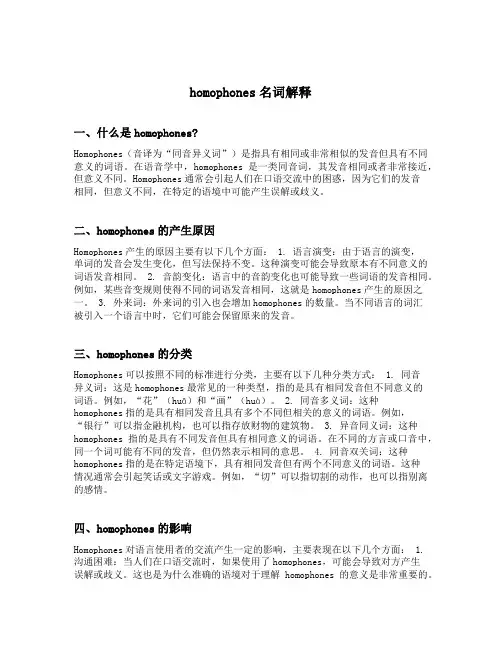
homophones名词解释一、什么是homophones?Homophones(音译为“同音异义词”)是指具有相同或非常相似的发音但具有不同意义的词语。
在语音学中,homophones是一类同音词,其发音相同或者非常接近,但意义不同。
Homophones通常会引起人们在口语交流中的困惑,因为它们的发音相同,但意义不同,在特定的语境中可能产生误解或歧义。
二、homophones的产生原因Homophones产生的原因主要有以下几个方面: 1. 语言演变:由于语言的演变,单词的发音会发生变化,但写法保持不变。
这种演变可能会导致原本有不同意义的词语发音相同。
2. 音韵变化:语言中的音韵变化也可能导致一些词语的发音相同。
例如,某些音变规则使得不同的词语发音相同,这就是homophones产生的原因之一。
3. 外来词:外来词的引入也会增加homophones的数量。
当不同语言的词汇被引入一个语言中时,它们可能会保留原来的发音。
三、homophones的分类Homophones可以按照不同的标准进行分类,主要有以下几种分类方式: 1. 同音异义词:这是homophones最常见的一种类型,指的是具有相同发音但不同意义的词语。
例如,“花”(huā)和“画”(huà)。
2. 同音多义词:这种homophones指的是具有相同发音且具有多个不同但相关的意义的词语。
例如,“银行”可以指金融机构,也可以指存放财物的建筑物。
3. 异音同义词:这种homophones指的是具有不同发音但具有相同意义的词语。
在不同的方言或口音中,同一个词可能有不同的发音,但仍然表示相同的意思。
4. 同音双关词:这种homophones指的是在特定语境下,具有相同发音但有两个不同意义的词语。
这种情况通常会引起笑话或文字游戏。
例如,“切”可以指切割的动作,也可以指别离的感情。
四、homophones的影响Homophones对语言使用者的交流产生一定的影响,主要表现在以下几个方面: 1. 沟通困难:当人们在口语交流时,如果使用了homophones,可能会导致对方产生误解或歧义。
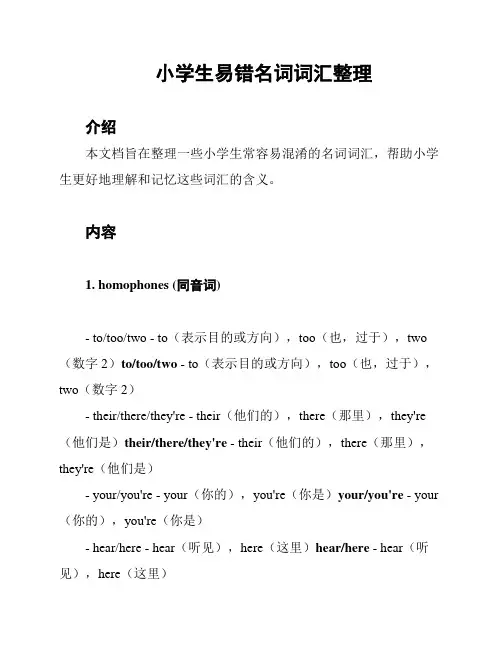
小学生易错名词词汇整理介绍本文档旨在整理一些小学生常容易混淆的名词词汇,帮助小学生更好地理解和记忆这些词汇的含义。
内容1. homophones (同音词)- to/too/two - to(表示目的或方向),too(也,过于),two (数字2)to/too/two - to(表示目的或方向),too(也,过于),two(数字2)- their/there/they're - their(他们的),there(那里),they're (他们是)their/there/they're - their(他们的),there(那里),they're(他们是)- your/you're - your(你的),you're(你是)your/you're - your (你的),you're(你是)- hear/here - hear(听见),here(这里)hear/here - hear(听见),here(这里)2. homographs (同形异义词)- bow - 弓(n.);鞠躬(v.)bow - 弓(n.);鞠躬(v.)- lead - 铅(n.);带领(v.)lead - 铅(n.);带领(v.)- tear - 眼泪(n.);撕裂(v.)tear - 眼泪(n.);撕裂(v.)3. heteronyms (同拼异音词)- read - 阅读(v.,音标:/read - 阅读(v.,音标:/ri:d/);过去式和过去分词是read(音标:/red/)4. 不可数名词(uncountable nouns)- water - 水water - 水- sugar - 糖sugar - 糖- rice - 米饭rice - 米饭5. 动词(verbs)与名词(nouns)的区别- cut - v.切割;n.切口cut - v.切割;n.切口- think - v.思考;n.思维think - v.思考;n.思维结论通过对小学生易错名词词汇的整理和区分,希望能提高小学生对这些词汇的理解和正确应用能力,避免混淆。
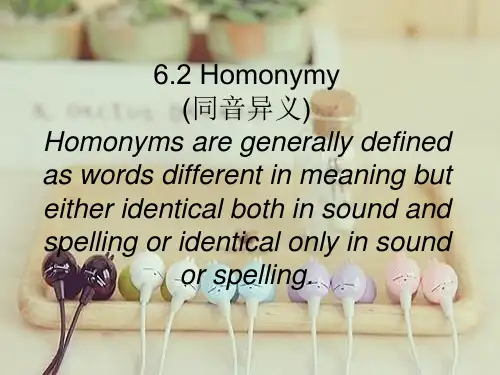
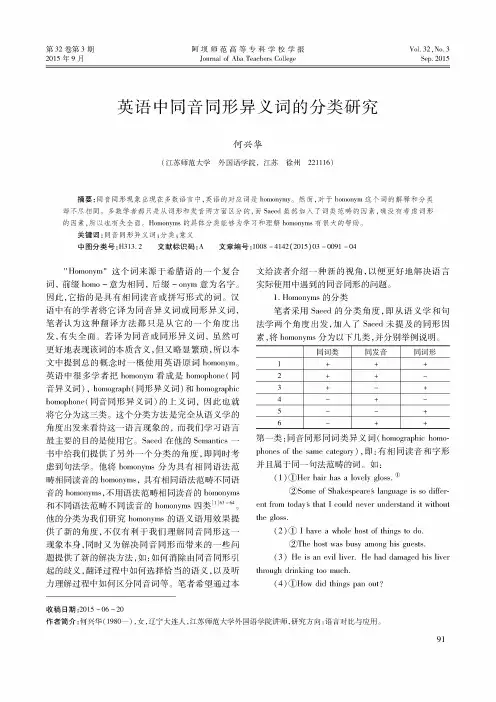
第32卷第3期2015年9月阿坝师范高等专科学校学报Journal of Aba Teachers CollegeVol.32,No.3Sep.2015英语中同音同形异义词的分类研究何兴华(江苏师范大学外国语学院,江苏徐州221116)摘要:同音同形现象出现在多数语言中,英语的对应词是homonymy。
然而,对于homonym这个词的解释和分类 却不尽相同。
多数学者都只是从词形和发音两方面区分的,而Saeed虽然加入了词类范畴的因素,确没有考虑词形 的因素,所以也有失全面。
Homonyms的具体分类能够为学习和理解homonyms有很大的帮助。
关键词:同音同形异义词;分类;意义中图分类号:H313.2 文献标识码:A文章编号:1008 -4142 (2015 #03 -0091 -04"H o m o n y m"这个词来源于希腊语的一个复合词,前缀h o m o-意为相同,后缀-o n y m意为名字&因此,它指的是具有相同读音或拼写形式的词。
汉语中有的学者将它译为同音异义词或同形异义词,笔者认为这种翻译方法都只是从它的一个角度出发,有失全面。
若译为同音或同形异义词,虽然可更好地表现该词的本质含义,但又略显繁琐,所以本文中提到总的概念时一概使用英语原词hom onym。
英语中很多学者把hom onym看成是homophone (同音异义词),hom ograph(同形异义词)和homographic hom ophone(同音同形异义词)的上义词,因此也就将它分为这三类。
这个分类方法是完全从语义学的角度出发来看待这一语言现象的,而我们学习语言最主要的目的是使用它。
S a e e d在他的Semantics —书中给我们提供了另外一个分类的角度,即同时考虑到句法学。
他将h om onym s分为具有相同语法范畴相同读音的hom onym s,具有相同语法范畴不同语音的hom onym s,不用语法范畴相同读音的homonyms 和不同语法范畴不同读音的h o m o n y m s四类[1]63_64。
英文同音异义词(homonym)add –ad 增加—广告aid –aide 援助–助手allowed –aloud 允许–大声地ark –arc 方舟(圣经)-- 弧形bail –bale 保释–大包band –banned 乐队–禁止base –bass 基础–男低音beach –beech 海滩–山毛榉(植物)bear –bare 熊/忍受–空的bite –byte 咬–字节block –bloc 街区–集团blue –blew 蓝色–吹(blow过去式)bored –board 无聊的–甲板bread –bred 面包–饲养(breed过去式)break –brake 打破–刹车brews –bruise 酿造–挫伤browse –brows 浏览–眉毛bury –berry 埋葬–浆果cannon –canon 大炮–卡农曲cereal –serial 谷类植物–连续剧chili –chilly 辣椒–寒冷的choose –chews 选择–咀嚼clause –claws 条款–爪子colonel –kernel 上校–果仁complimentary –complementary 称赞的–补充的course –coarse 课程–粗糙的creak –creek 嘎吱声–小溪cruise –crews巡航–全体船员dessert –desert 甜点–沙漠die –dye 死亡–染色fate –fete 命运–庆祝find –fined 发现–罚款的flee –flea 逃跑–跳蚤flower –flour 花儿–面粉fur –fir 毛皮–冷杉guerrilla –gorilla 游击队–大猩猩heal –heel 治愈–脚后跟heroin –heroine 海洛因–女主角him –hymn 他–颂歌horse –hoarse 马–嘶哑的I’ll –isle –aisle 我将–小岛–过道idle –idol 懒散的–偶像knows –noses 知道(单三式)-- 鼻子(复数)know –no 知道–不leak –leek 泄露–韭菜led –lead 领导(lead过去式)–铅made –maid 制造(过去式)–女仆marshal –martial 总指挥–武术的mat –matt 垫子–无光泽的mayor –mare 市长–母马medal –meddle 奖章–干涉missed –mist 想念–薄雾not –knot 不–结one –won 一–赢(过去式)ours –hours 我们的–小时(复数)overseas –oversees 海外的–监督(单三式)pair –pear –pare 一双-- 梨-- 消减palate –palette –pallet 味觉-- 调色板-- 托盘paste –paced 浆糊-- 步伐的pour –pore 倾泻-- 毛孔peak –peek –pique 顶端-- 偷窥-- 怄气peer –pier 同龄人-- 码头pigeon –pidgin 鸽子-- 混杂语plum –plumb 李子-- 铅锤pole –poll 柱,杆-- 民意测验queue –cue 排队-- 提示rain –reign –rein 雨-- 统治-- 缰绳raise –raze –rays 升起-- 摧毁-- 射线sensor –censor 传感器-- 监察官sent –cent –scent 送(过去式)-- 分币-- 气味shoot –chute 射击-- 斜槽soar –sore 高飞-- 疼痛的soul –sole –Seoul 精神-- 唯一的-- 首尔(韩国首都)stair –stare 楼梯-- 盯着看stake –steak 柱子-- 牛排stationary –stationery 静止的-- 文具straight –strait 径直的-- 海峡swat –swot 猛击-- 苦读sweet –suite 甜的-- 套房tale –tail 故事-- 尾巴taught –taut 教(过去式)-- 拉紧的team –teem 组-- 充满tear –tier 眼泪-- 排,层tick –tic 勾号-- 抽筋time –thyme 时间-- 百里香toe –tow 脚趾-- 拖,拉vain –vein 徒劳的-- 静脉wait –weight 等待-- 重量warn –worn 警告-- 穿(wear过去式)waste –waist 浪费-- 腰wave –waive 海浪-- 放弃way –weigh 方法-- 称重week –weak 星期-- 虚弱的we’ll –wheel 我们将-- 车轮we’ve –weave 我们已经-- 编织whale –wail -- wale 鲸-- 痛哭-- 鞭痕what –watt 什么-- 瓦特where –wear –ware 哪里-- 穿-- 器皿whether –weather 是否-- 天气which –witch 哪一个-- 女巫whole –hole 整个的-- 洞wine -- whine 酒-- 哀号。
英文同音异义词(homonym)add –ad 增加—广告aid –aide 援助–助手allowed –aloud 允许–大声地ark –arc 方舟(圣经)-- 弧形bail –bale 保释–大包band –banned 乐队–禁止base –bass 基础–男低音beach –beech 海滩–山毛榉(植物)bear –bare 熊/忍受–空的bite –byte 咬–字节block –bloc 街区–集团blue –blew 蓝色–吹(blow过去式)bored –board 无聊的–甲板bread –bred 面包–饲养(breed过去式)break –brake 打破–刹车brews –bruise 酿造–挫伤browse –brows 浏览–眉毛bury –berry 埋葬–浆果cannon –canon 大炮–卡农曲cereal –serial 谷类植物–连续剧chili –chilly 辣椒–寒冷的choose –chews 选择–咀嚼clause –claws 条款–爪子colonel –kernel 上校–果仁complimentary –complementary 称赞的–补充的course –coarse 课程–粗糙的creak –creek 嘎吱声–小溪cruise –crews巡航–全体船员dessert –desert 甜点–沙漠die –dye 死亡–染色fate –fete 命运–庆祝find –fined 发现–罚款的flee –flea 逃跑–跳蚤flower –flour 花儿–面粉fur –fir 毛皮–冷杉guerrilla –gorilla 游击队–大猩猩heal –heel 治愈–脚后跟heroin –heroine 海洛因–女主角him –hymn 他–颂歌horse –hoarse 马–嘶哑的I’ll –isle –aisle 我将–小岛–过道idle –idol 懒散的–偶像knows –noses 知道(单三式)-- 鼻子(复数)know –no 知道–不leak –leek 泄露–韭菜led –lead 领导(lead过去式)–铅made –maid 制造(过去式)–女仆marshal –martial 总指挥–武术的mat –matt 垫子–无光泽的mayor –mare 市长–母马medal –meddle 奖章–干涉missed –mist 想念–薄雾not –knot 不–结one –won 一–赢(过去式)ours –hours 我们的–小时(复数)overseas –oversees 海外的–监督(单三式)pair –pear –pare 一双-- 梨-- 消减palate –palette –pallet 味觉-- 调色板-- 托盘paste –paced 浆糊-- 步伐的pour –pore 倾泻-- 毛孔peak –peek –pique 顶端-- 偷窥-- 怄气peer –pier 同龄人-- 码头pigeon –pidgin 鸽子-- 混杂语plum –plumb 李子-- 铅锤pole –poll 柱,杆-- 民意测验queue –cue 排队-- 提示rain –reign –rein 雨-- 统治-- 缰绳raise –raze –rays 升起-- 摧毁-- 射线sensor –censor 传感器-- 监察官sent –cent –scent 送(过去式)-- 分币-- 气味shoot –chute 射击-- 斜槽soar –sore 高飞-- 疼痛的soul –sole –Seoul 精神-- 唯一的-- 首尔(韩国首都)stair –stare 楼梯-- 盯着看stake –steak 柱子-- 牛排stationary –stationery 静止的-- 文具straight –strait 径直的-- 海峡swat –swot 猛击-- 苦读sweet –suite 甜的-- 套房tale –tail 故事-- 尾巴taught –taut 教(过去式)-- 拉紧的team –teem 组-- 充满tear –tier 眼泪-- 排,层tick –tic 勾号-- 抽筋time –thyme 时间-- 百里香toe –tow 脚趾-- 拖,拉vain –vein 徒劳的-- 静脉wait –weight 等待-- 重量warn –worn 警告-- 穿(wear过去式)waste –waist 浪费-- 腰wave –waive 海浪-- 放弃way –weigh 方法-- 称重week –weak 星期-- 虚弱的we’ll –wheel 我们将-- 车轮we’ve –weave 我们已经-- 编织whale –wail -- wale 鲸-- 痛哭-- 鞭痕what –watt 什么-- 瓦特where –wear –ware 哪里-- 穿-- 器皿whether –weather 是否-- 天气which –witch 哪一个-- 女巫whole –hole 整个的-- 洞wine -- whine 酒-- 哀号。
Bear Bear Bear are animals of black color. He cannot bear pain.Sink Sink Sink is in the kitchen. Plane sank into the river.Bank Bank She sat on the river bankHe is going to bank for a loan.Date Date What is the date today?He is on a date with his girlfriend.Ring Ring They were fighting in the ring. He gifted me a ring.Can Can He can play a flute. He want a Pepsi can.Left Left There is a cat on you left side. He left his phone in the car.Put Put Please put the shoes on the floor. He is putting me forward.Clip Clip My hair clip is of red color.Her video clips were leaked last month.Ruler Ruler He was the great ruler of his time. Please give me your ruler.Stalk Stalk He would pollinate a wheat stalk. Ghosts are said to stalk the castle walls.Bat Bat Bat is a bird of black color.He is playing with a cricket bat.Rose Rose He rose his hand for answer. Rose flower is very beautiful.Wave Wave She waves her hand and go away. Radioactive waves are very dangerous for humans.Scale Scale He draw a line with his scale. This pipe is full of scale.Spring Spring This spring is very hard.I love spring season.Palm Palm Palm trees are very long.He hit him with the palm of his hand.Address Address What is your home address?Please address all letters to this office.Drop Drop Dew drops are falling onto the grass. She hoped he'd drop the subjectLetter Letter There are 26 letters in English I had post the letter yesterday.Tie Tie He used to wear a black tie along with white shirt.This match will tie.Duck Duck Ducks are beautiful birds.He will not duck the issue any more.Book Book Please book a cab for me.I like poetry books.Ship Ship I used to travel by ship.He is shipping his parcel to England.File File My file was blue in color. Carpenter is filing the door.Park Park National Park is very beautiful. Please park your car outside.Well Well Well done! You passed the exam. This well has no water.Match Match There is no cricket match today. He has no match with me.。
homograph语言学名词解释【原创实用版】目录1.概述2.定义与解释3.类型与例子4.语言学中的应用5.总结正文1.概述homograph(同形异义词)是语言学中的一个重要概念,它指的是具有相同拼写形式但具有不同语义和/或词性的单词。
这类单词在英语中十分常见,如“bank”既可以表示“银行”,也可以表示“河岸”。
2.定义与解释从定义上来说,homograph 是一个多义词,即一个单词有多个意思。
这些意思可能相同,也可能不同。
在英语中,homograph 通常包括以下几种类型:- 多义词:一个单词有多个意思,但词性相同。
如“play”既可以表示“玩耍”,也可以表示“戏剧”。
- 异义词:一个单词有多个意思,且词性不同。
如“bank”既可以表示“银行”(名词),也可以表示“河岸”(名词)。
- 同音词:一个单词有多个意思,但发音相同。
如“lead”既可以表示“领导”,也可以表示“铅”。
3.类型与例子以下是一些常见的 homograph 类型及其例子:- 多义词:如“head”可以表示“头”(名词),也可以表示“向……方向”(动词)。
- 异义词:如“spring”可以表示“春天”(名词),也可以表示“弹簧”(名词)。
- 同音词:如“right”可以表示“正确”(形容词),也可以表示“右”(名词)。
4.语言学中的应用在语言学研究中,homograph 是一个非常重要的概念,它可以帮助我们理解语言的复杂性和多样性。
同时,homograph 也是语言学习中的一个难点,因为它容易让学习者产生混淆。
因此,研究 homograph 对于语言学和语言教学具有重要意义。
5.总结总的来说,homograph 是语言学中的一个重要概念,它指的是具有相同拼写形式但具有不同语义和/或词性的单词。
这类单词在英语中十分常见,如“bank”既可以表示“银行”,也可以表示“河岸”。